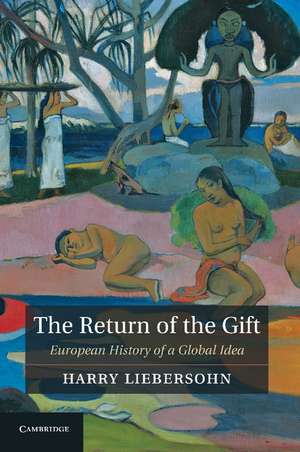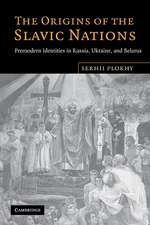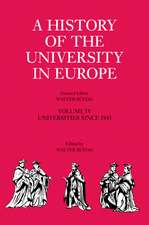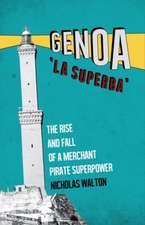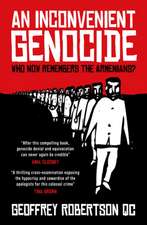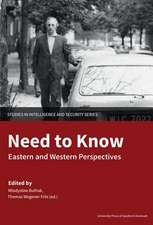The Return of the Gift: European History of a Global Idea
Autor Harry Liebersohnen Limba Engleză Paperback – 24 oct 2012
| Toate formatele și edițiile | Preț | Express |
|---|---|---|
| Paperback (1) | 282.87 lei 6-8 săpt. | |
| Cambridge University Press – 24 oct 2012 | 282.87 lei 6-8 săpt. | |
| Hardback (1) | 691.14 lei 6-8 săpt. | |
| Cambridge University Press – 5 dec 2010 | 691.14 lei 6-8 săpt. |
Preț: 282.87 lei
Nou
Puncte Express: 424
Preț estimativ în valută:
54.13€ • 56.17$ • 45.25£
54.13€ • 56.17$ • 45.25£
Carte tipărită la comandă
Livrare economică 17-31 martie
Preluare comenzi: 021 569.72.76
Specificații
ISBN-13: 9781107411418
ISBN-10: 1107411416
Pagini: 224
Dimensiuni: 152 x 229 x 13 mm
Greutate: 0.34 kg
Editura: Cambridge University Press
Colecția Cambridge University Press
Locul publicării:New York, United States
ISBN-10: 1107411416
Pagini: 224
Dimensiuni: 152 x 229 x 13 mm
Greutate: 0.34 kg
Editura: Cambridge University Press
Colecția Cambridge University Press
Locul publicării:New York, United States
Cuprins
Introduction; 1. The crisis of the gift: Warren Hastings and his critics; 2. Liberalism, self-interest, and the gift; 3. The selfless 'savage': theories of primitive communism; 4. Anthropologists and the power of the gift: Boas, Thurnwald, Malinowski; 5. Marcel Mauss and the globalized gift; Conclusion.
Recenzii
Review of the hardback: 'Lively, deeply informed, and interpretively adventurous, The Return of the Gift is itself a gift to scholars across the human sciences and humanities. Liebersohn provides a bracing and generative account of this key concept, locating it in an intellectual lineage of wrestling with cultural differentiation, evolutionary models, and ethical concerns. In the best Maussian spirit, this innovative book invites our engagement - and amply repays it.' Donald Brenneis, University of California, Santa Cruz
Review of the hardback: 'Masterly commanding disparate traditions of thought, Harry Liebersohn traces with elegant concision the back story of Marcel Mauss's celebrated essay on The Gift. Moving as easily across centuries and national boundaries as he does scholarly disciplines, he reveals the over-determined genesis of a seminal idea that is still ramifying well into our own day.' Martin Jay, University of California, Berkeley
Review of the hardback: 'Tracking the voyage of an idea - the gift - over land and sea, from liberalism to socialism, through social scientific and humanist scholarship, Liebersohn delivers an intellectual history that refuses to be confined to a continent or a discipline. European thinking about the complicated reciprocity of the transfer of presents offers something no less richly complex in return: reflection on cultural practices of giving and receiving are presented here always as negotiated exchanges within and between worlds. This book is a gift.' Scott Spector, University of Michigan
Review of the hardback: 'This lucidly written and insightful book follows the fortunes of the gift in European social thought from Thomas Hobbes through Marcel Mauss. Evoking fascinating life stories, intellectual traditions, changing economies, and war-torn worlds, Harry Liebersohn describes the waning of the idea of the gift among 19th-century political economists and its flowering among early 20th-century anthropologists. The Return of the Gift reminds us of the resources we have to make strangers into friends and to replace the calculations of the bottom line with the hopes for reciprocity.' Natalie Zemon Davis, University of Toronto
Review of the hardback: 'Harry Liebersohn's The Return of the Gift is an important contribution to the genealogy of changing understandings of the gift in the human sciences, which both re-affirms the centrality of Mauss's 1925 classic essay and replaces it within the ebb and flow of a broader European discourse on the gift.' Ilana Silber, Bar-Ilan University, Israel
Review of the hardback: 'Liebersohn has bequeathed a major gift to historians interested not only in the genealogy of the gift in European thought, but in the wider history of solidarity. His book spans confidently across three centuries, multiple disciplinary traditions and national literatures, and several continents.' Kenneth Loiselle, Trinity University
Review of the hardback: 'Masterly commanding disparate traditions of thought, Harry Liebersohn traces with elegant concision the back story of Marcel Mauss's celebrated essay on The Gift. Moving as easily across centuries and national boundaries as he does scholarly disciplines, he reveals the over-determined genesis of a seminal idea that is still ramifying well into our own day.' Martin Jay, University of California, Berkeley
Review of the hardback: 'Tracking the voyage of an idea - the gift - over land and sea, from liberalism to socialism, through social scientific and humanist scholarship, Liebersohn delivers an intellectual history that refuses to be confined to a continent or a discipline. European thinking about the complicated reciprocity of the transfer of presents offers something no less richly complex in return: reflection on cultural practices of giving and receiving are presented here always as negotiated exchanges within and between worlds. This book is a gift.' Scott Spector, University of Michigan
Review of the hardback: 'This lucidly written and insightful book follows the fortunes of the gift in European social thought from Thomas Hobbes through Marcel Mauss. Evoking fascinating life stories, intellectual traditions, changing economies, and war-torn worlds, Harry Liebersohn describes the waning of the idea of the gift among 19th-century political economists and its flowering among early 20th-century anthropologists. The Return of the Gift reminds us of the resources we have to make strangers into friends and to replace the calculations of the bottom line with the hopes for reciprocity.' Natalie Zemon Davis, University of Toronto
Review of the hardback: 'Harry Liebersohn's The Return of the Gift is an important contribution to the genealogy of changing understandings of the gift in the human sciences, which both re-affirms the centrality of Mauss's 1925 classic essay and replaces it within the ebb and flow of a broader European discourse on the gift.' Ilana Silber, Bar-Ilan University, Israel
Review of the hardback: 'Liebersohn has bequeathed a major gift to historians interested not only in the genealogy of the gift in European thought, but in the wider history of solidarity. His book spans confidently across three centuries, multiple disciplinary traditions and national literatures, and several continents.' Kenneth Loiselle, Trinity University
Descriere
This book is a history of modern European interpretations of the gift in global context.
